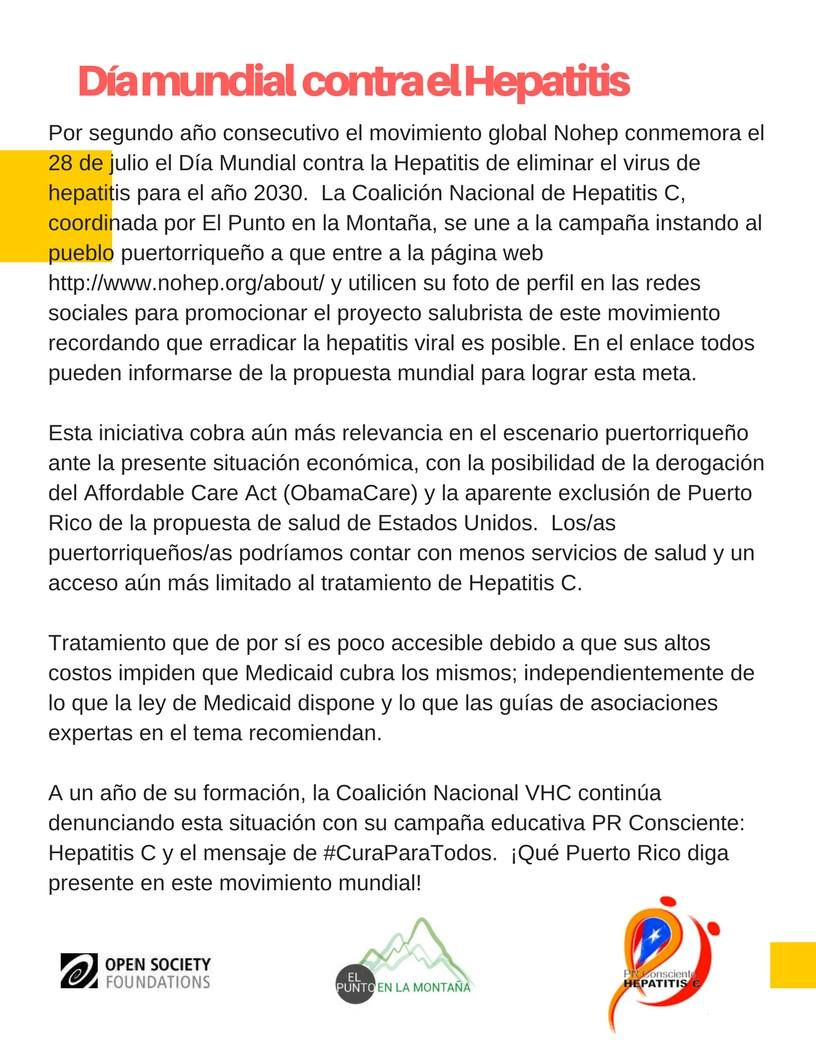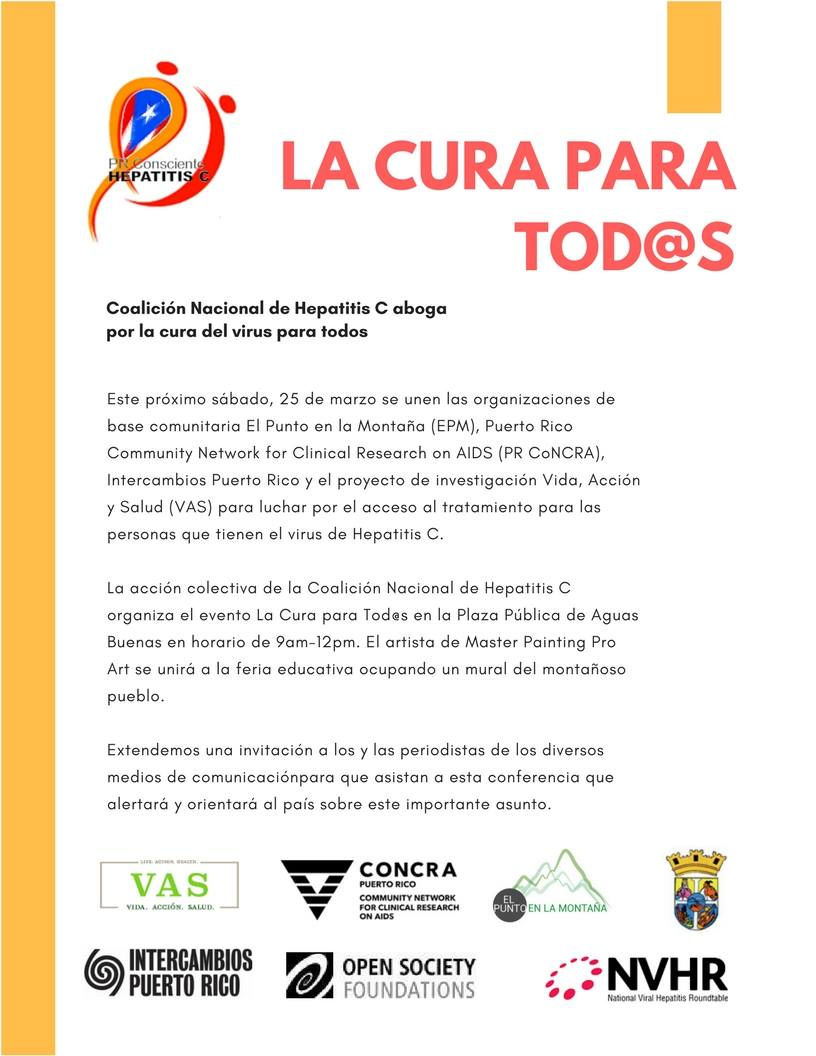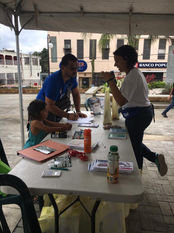
History of the National HCV Coalition
Sponsored by the National Viral Hepatitis Roundtable, the Puerto Rico National Hepatitis C Coalition was a coordinated effort by health professionals, representatives of non-profit organizations, researchers, and individuals living with the Hepatitis C virus (HCV) who joined forces to advocate for accessibility to HCV treatment on the island. This Coalition was coordinated and positioned in the media by El Punto en la Montaña, Inc. (EPM) staff. It was active from 2016-2018 carrying out efforts to advocate for various needs that we observed as part of our work in the context of harm reduction in Puerto Rico.
The Objectives of the National HCV Coalition from 2016-2018 were:
-
To raise awareness nationwide about the possibility of a Hepatitis C epidemic.
-
Advocate for the accessibility of Hepatitis C diagnostic tests and treatment to the general population of Puerto Rico.
-
Achieve a commitment to communication and negotiation with the FDA, the Puerto Rico Department of Health,
-
Insurers, Pharmaceutical Companies, and HCV Service Providers.
-
Assist in the creation of a public health policy that considers different strategies to reduce the costs of HCV treatment and ensure its accessibility.
-
Ensure that HCV-related services in Puerto Rico are efficient and benefit those who need them most.
Among the issues highlighted were advocating for the updating of epidemiological studies on Hepatitis C in Puerto Rico to include the needs of people who inject drugs (PWID), demanding the availability of Hepatitis C treatment on the island since due to the high cost of treatment this service was not available beyond a pilot study and by some private doctors, supporting the elimination of the sobriety requirement to receive Hepatitis C treatment services and including the Hepatitis C test as part of the annual tests suggested by health professionals (CBC or Complete Blood Count Tests). As part of our media initiative, we held a Press Conference, press releases, radio and television appearances and were interviewed by news media where we highlighted the lack of education about the Hepatitis C virus in Puerto Rico, how to access the few available treatments and highlighted the importance of including the needs of PWID in this health emergency that we call the “silent epidemic.” We also held a community health fair in Aguas Buenas where a local graffiti artist created a mural to raise awareness about this virus.
Our focus was on PWIDs not only because the organizations that formed part of the Coalition provide harm reduction services to this population, but also because this is the group at greatest risk of infection both on the island and in the United States. Faced with this scenario in which a Hepatitis C epidemic could break out in Puerto Rico, the National HCV Coalition advocated for the need to expand access to HCV treatments by taking this claim to the relevant agencies, institutions, and individuals. It even worked with the Community Legal Office Clinic at Interamerican University and the Center for Health Law and Policy Innovation of Harvard Law School (CHLPI) with the intention of evaluating the application of the Medicaid law in Puerto Rico in light of access to Hepatitis C treatment.
Even today, Puerto Rico still has a high incidence of infection, mostly among PWID, caused in part by limited access to syringes, lack of knowledge about the modes of infection, limited access to diagnostic tests, and limited treatment options. The latest available epidemiological evidence dates back to 2001-2002 and highlights a seroprevalence of 6.3% in the population between 20-69 years of age in San Juan. In 2007, Puerto Rican researchers reported on the state of emergency that existed on the island due to this prevalence and highlighted the risk that injectable drug use represents in the transmission of Hepatitis C.1 Ten years later, the National HCV Coalition continued this advocacy process, highlighting the voices of PWID. Finally, last year, EPM members presented the results of research conducted with a sample of our population that showed a 73% prevalence of Hepatitis C antibodies and a 53% prevalence of the virus after a confirmatory test.2 PID continue to need the most attention, but they continue to be the most forgotten. With a generous B, it can be seen in the State of Medicaid Access Report Card for Hepatitis C that access to treatment in Puerto Rico is better and part of the Coalition’s demands would no longer apply.3 However, people most affected by the virus continue to face difficulties in accessing treatment. The majority of EPM participants fall under this category, needing the most support to receive these health services.
_______________
1. Pérez, C. M., Albizu, C., Peña, M., Torres, E. A., Reyes, J. C., Colo´n, H., … Suárez, E. (2007). Hepatitis C in
Puerto Rico: A time for public health action. Puerto Rico Health Sciences Journal, 26(4).
2. Aponte-Meléndez, Y., Eckhardt, B., Fong, C., Padilla, A., Trinidad-Martínez, W., Maldonado-Rodríguez, E., …
Mateu-Gelabert, P. (2023). Hepatitis C virus care cascade among people who inject drugs in Puerto Rico: Minimal
HCV treatment and substantial barriers to HCV care. Drug and Alcohol Dependence Reports, 8.
3. https://stateofhepc.org/wp-content/uploads/2021/05/Puerto-Rico-January-2024_clean.pdf





Epidemia silenciosa provocada por la Hepatitis C
High HCV cure rates for people who use drugs treated with direct acting antiviral therapy at an urban primary care clinic
Alta la prevalencia de la Hepatitis C
Por: Luz Nereida Vélez - WAPA TV







